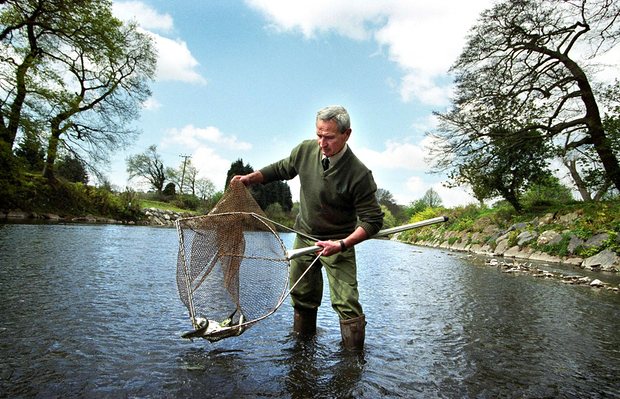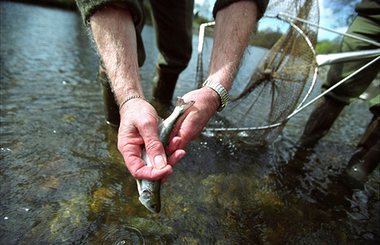Cardiff, Brighton and Hove, Plymouth and the London borough of Lambeth are the first cities to be recognised as leaders of the UK’s Sustainable Food Cities network – with Cardiff having been acclaimed for signing a sustainable fish cities pledge that impacts on the whole of Wales.
Cardiff’s achievements follow hard on the heels of the towns of Bournemouth and Poole, which recently became the first to receive the five-star “sustainable fish city” award.
“Cardiff is setting a new, much higher standard for sustainable fish policies,” said Ruth Westcott, coordinator of Sustainable Fish Cities, a campaign run by an alliance of not-for-profit organisations that hopes to reverse destructive methods of fishing which threaten the future of some species. “It’s worked hard to get major institutions to sign up to these policies. Other cities should take note, and see how one city can successfully push for change not only within its own boundaries but across a whole country.”
One of Cardiff’s biggest breakthroughs was getting the NHS Wales Shared Services Partnership to sign the sustainable fish pledge recently, meaning that all hospital fish meals in the city – and right across Wales – will only be made using sustainable fish.
Jessica Bearman, lead dietician for NHS Wales Shared Services, said: “As an organisation, we buy 120 tonnes of fish a year so when it comes to sustainability, we can make a difference in terms of scale. Hospitals can still serve fantastic fish dishes and we can continue to enjoy traditional favourites like battered cod, but it’ll be sustainably sourced.”
A similar sustainable fish pledge has already been made by Cardiff’s primary and secondary schools, Cardiff University and the University of South Wales, so in all, some five million fish meals a year in the city will now be sourced using sustainable methods.
“England and Scotland are way behind on this,” Westcott said. “Cities need to look to Cardiff to see how making big deals happen – such as getting hospital trusts and schools to opt for sustainable food – has a real impact on many people’s diets and the environment.”
So far, only two private hospital food providers and four hospital or health trusts in England have signed the sustainable fish pledge, despite new requirements which come into force on 1 April 2015, which will make sustainable fish compulsory for all food served in hospitals or health trusts in England.
Cardiff’s work on sustainable fish is part of the reason it is among the first cities to receive an award from the Sustainable Food Cities network, established in 2013 by the Soil Association, in partnership with Food Matters and Sustain. Funded by the Esme Fairbairn Foundation, all member cities of the network receive funding to develop their sustainable food policies.
Brighton and Hove is the only city to receive a silver award during a two-day international Sustainable Food conference hosted by Bristol, the 2015 European Green Capital, and featuring representatives from 70 towns and cities across the UK and Europe. Cardiff, Plymouth and the London borough of Lambeth all receive bronze awards.
Part of the conference focuses on how the campaign can be taken to cities worldwide: attendees from countries such as Greece, Slovenia, France, Romania and Denmark will be able to learn from case studies on how to improve food, health and sustainability at city level.
Cardiff’s approach has included appointing a sustainable food cities coordinator and setting up a network called Food Cardiff, which meets regularly to pool resources and efforts, working on everything from growing projects to encouraging catering and food suppliers within the private and public sector to be more sustainable. Projects across the city, including the Riverside Farmers’ Market and the Adamsdown Community Garden, are about helping people gain access to cheap, high-welfare, fresh food.
In Plymouth, the award has come about as a result of its cooperative of 30 local producers, which now deliver affordable, sustainable food to collection points in deprived parts of the city. Lambeth is being recognised for its edible bus stops and its social supermarket, which sells subsidised products to those on low incomes. A silver award goes to Brighton and Hove for food growing space – successful development applications incorporating food space have increased in the area from one per cent to 38 per cent, which is a major boost towards locals and community groups growing their own food.
Tom Andrews, Soil Association national programme manager of Sustainable Food Cities says: “In the absence of national government action, cities are taking on the incredibly serious food challenges that face us all. It will be interesting to see, in the weeks running up to the Westminster election, whether the main political parties recognise the urgency of these challenges and commit to doing what is needed to help tackle them.”
• This article was updated on 18 March 2015 to reflect the fact that the towns of Bournemouth and Poole, rather than the city of Cardiff, were first to receive a five-star “sustainable fish city” award.


Leave a Reply
You must be logged in to post a comment.